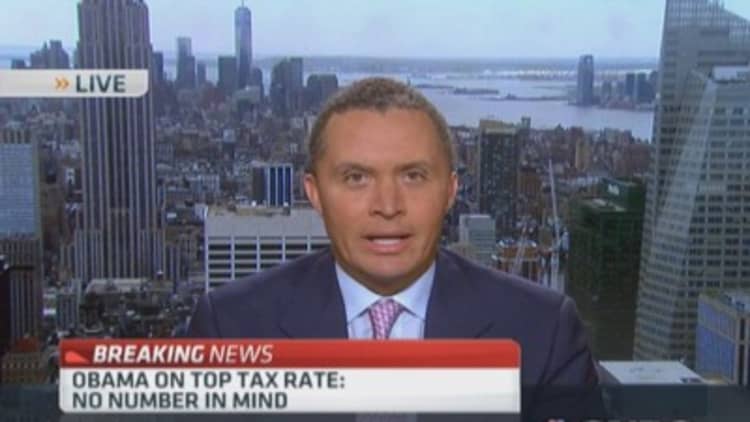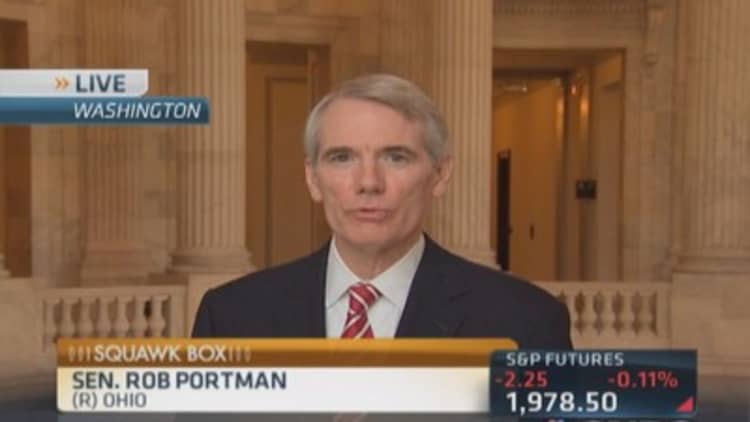
Washington is as cynical a place as you will find on earth but President Barack Obama's latest attack on corporate "deserters" in a speech in Los Angeles and an interview with CNBC's Steve Liesman sets a new bar.
Obama brought the full weight of the Oval Office to the issue of U.S. companies acquiring sizable stakes in foreign firms in order to reduce their U.S. tax burden, saying doing so is "neither fair nor is it something that's going to be good for the country over the long-term."
Obama added, "If you are doing business here, if you are basically an American company but you are simply changing your mailing address in order to avoid paying taxes then you are really not doing right by the country and the American people."
Obama went on to urge Congress to pass a one-off bill making corporate inversions illegal, something that has actually been done repeatedly but never worked. These kinds of stand-alone proposals, in fact, are the main reason the corporate tax code, unreformed in nearly 30 years, is a horrific, tangled 70,000-page mess that mainly serves as a full-employment program for creative bankers and accountants looking to game the system.
Obama went on to say he stands "four square behind" broader tax reform that would lower the overall rate and close loopholes beloved by individual companies and industries.
Read MoreTaxes will go up if inversions rise: Mark Cuban
The fact of the matter, however, is that the administration has never pushed hard for corporate tax reform proposals put forward after many years of hard work by former Senate Finance Committee chairman Max Baucus, whose prize for getting stiffed by the White House on his main objective—fixing an antiquated and anti-competitive U.S. tax code—was an ambassadorship to China (a posting that puzzled the Chinese).
Liberal Democrats generally revolt at the idea of lowering corporate tax rates without somehow also generating additional large amounts of new government revenue, something that Republicans are unwilling to deliver. The obvious solution to this—a revenue neutral tax code revamp that lowers the top rate while making sure all companies actually pay it—has never gained much traction with Democrats or the White House, despite Obama's comments to the contrary. To be fair, many Republicans also balk at this when the loopholes in questions are favored by big donors.
Meanwhile, there is virtually no chance Congress will move legislation to forbid tax inversions because even many Democrats, including on the Senate Finance Committee, are sympathetic to the argument that this would be further punishing U.S. firms that already face far higher corporate tax rates than nearly all their competitors as well as an archaic global tax system that subjects profits earned abroad by U.S. companies to applicable U.S. tax rates.
Read More Obama: What's legal might not be right for US
Most developed nations have rejected this approach in favor of a territorial tax system and moved aggressively to lower their overall corporate rates.
So Obama's move should be seen as mostly political. It sounds good to oppose U.S. companies, lately many drug makers, using inversions to nominally relocate abroad. And indeed inversions are an unfortunate result of Washington's inability to fix the tax system. But in most cases they are perfectly logical moves for companies that can find both good foreign acquisition targets and who face tax rates that reduce their ability to compete with foreign firms.
Ohio GOP Sen. Rob Portman, a possible 2016 presidential contender, made this case on CNBC's "Squawk Box" on Friday morning, arguing that you cannot close the inversion "loophole" because companies will just find other ways to lower their U.S. tax burden that would be even worse for jobs and the American economy.

"You can't really close the loophole because people are going to find other ways to become foreign corporations, and it would be terrible tax policy," Portman said. "We've got to reform the tax code. We've got to get at the underlying problem. If you make it even more disadvantageous to be an American company what is going to happen is you are going to see more companies become foreign companies."
And he rejected the "deserters" line: "The problem is Washington. In a way these companies are economic refugees."
The problem with targeting inversion alone is that if you take that tool out of the corporate arsenal outside the context of lowering the overall rate while eliminating loopholes you almost certainly wind up making U.S. companies less globally competitive and thus less likely to hire both at home and abroad. It also encourages foreign takeovers of U.S. firms, as Portman discussed.
Read MoreObama, Dems holding tax reform hostage: Norquist
But the White House likely knows it won't have to worry about the impact of actual legislation because while there is uniform agreement that inversions are a bad thing—and even some bipartisan interest in stand-alone bills—there is no agreement on how to address the problem.
So, in the meantime, the White House can bask in the glow of the "economic patriotism" without actually doing anything to make the U.S. a more competitive and hospitable place to do business.
—By Ben White. White is Politico's chief economic correspondent and a CNBC contributor. He also authors the daily tip sheet Politico Morning Money [politico.com/morningmoney]. Follow him on Twitter @morningmoneyben.


